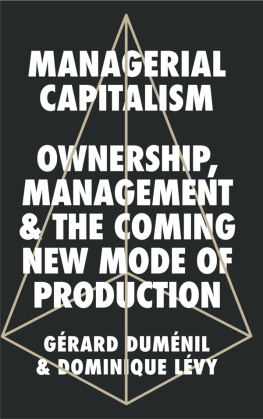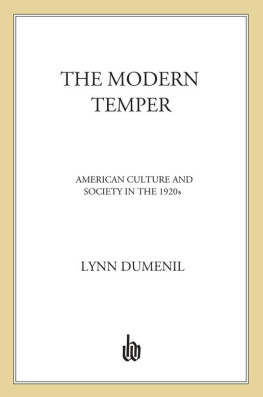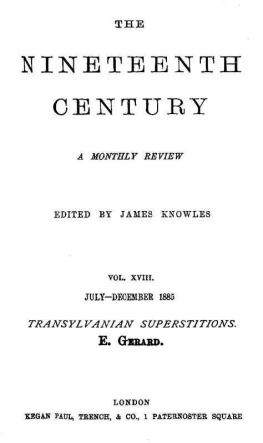Duménil Gérard - Managerial Capitalism
Here you can read online Duménil Gérard - Managerial Capitalism full text of the book (entire story) in english for free. Download pdf and epub, get meaning, cover and reviews about this ebook. publisher: Pluto Press, genre: Politics. Description of the work, (preface) as well as reviews are available. Best literature library LitArk.com created for fans of good reading and offers a wide selection of genres:
Romance novel
Science fiction
Adventure
Detective
Science
History
Home and family
Prose
Art
Politics
Computer
Non-fiction
Religion
Business
Children
Humor
Choose a favorite category and find really read worthwhile books. Enjoy immersion in the world of imagination, feel the emotions of the characters or learn something new for yourself, make an fascinating discovery.
- Book:Managerial Capitalism
- Author:
- Publisher:Pluto Press
- Genre:
- Rating:4 / 5
- Favourites:Add to favourites
- Your mark:
- 80
- 1
- 2
- 3
- 4
- 5
Managerial Capitalism: summary, description and annotation
We offer to read an annotation, description, summary or preface (depends on what the author of the book "Managerial Capitalism" wrote himself). If you haven't found the necessary information about the book — write in the comments, we will try to find it.
Managerial Capitalism — read online for free the complete book (whole text) full work
Below is the text of the book, divided by pages. System saving the place of the last page read, allows you to conveniently read the book "Managerial Capitalism" online for free, without having to search again every time where you left off. Put a bookmark, and you can go to the page where you finished reading at any time.
Font size:
Interval:
Bookmark:

Managerial Capitalism
Ownership, Management and the
Coming New Mode of Production
Grard Dumnil and Dominique Lvy

First published 2018 by Pluto Press
345 Archway Road, London N6 5AA
www.plutobooks.com
Copyright Grard Dumnil and Dominique Lvy 2018
The right of Grard Dumnil and Dominique Lvy to be identified as the authors of this work has been asserted by them in accordance with the Copyright, Designs and Patents Act 1988.
British Library Cataloguing in Publication Data
A catalogue record for this book is available from the British Library
ISBN 978 0 7453 3754 8 Hardback
ISBN 978 0 7453 3753 1 Paperback
ISBN 978 1 7868 0221 7 PDF eBook
ISBN 978 1 7868 0223 1 Kindle eBook
ISBN 978 1 7868 0222 4 EPUB eBook
This book is printed on paper suitable for recycling and made from fully managed and sustained forest sources. Logging, pulping and manufacturing processes are expected to conform to the environmental standards of the country of origin.
Typeset by Stanford DTP Services, Northampton, England
Simultaneously printed in the United Kingdom and United States of America
Seizing the opportunity created by the two-hundredth anniversary of Marxs birth on May 5, 1818, this book defends a two-sided thesis. First, as analytical framework, Marxs theory of history remains unchallenged; second, despite the failure of the expectations regarding the ability of the proletarian class to supersede capitalist relations of production, the struggle of popular classes is the single force capable of impacting the course of history in the direction of social progress.
There is, however, a but. Marxs analysis of history requires a thorough revision in one key respect: Rather than straightforwardly paving the way to the implementation of a classless society, current relations of production undergo a process of transition toward a new mode of production, managerialism, whose upper class is the class of managers.
In the available literature, managerial traits are typically treated as an odd feature of contemporary capitalism, quite adequately denoted as managerial capitalism on such grounds, but the hybrid character of relations of production in the full Marxian sense of the phrase is overlooked. The consequences of this misreading of historical dynamics are severe. In our opinion, the revision of Marxs analytical frameworkthe single alternative to its outright abandonmentis the precondition to the interpretation of past and current economic, social, and political trends.
Major political consequences are implied. One cannot change the world with ideas but, as Marx did, we believe they can help. To contribute to this analytical revolution is the main ambition of the present endeavor.
This book combines a broad variety of distinct approaches in a rather unusual and dense fashion. A number of chapters make an extensive use of data sets regarding income distribution and technical change; others attend to theoretical frameworks, first of all Marxs theory of history; a third field is the examination of sequences of economic and political events since World War I. Wide use is also made of the work of historians in the analysis of secular social transformations and ideologies.
As suggested in the Introduction, the relationship between our thesis and Marxs analytical framework is an uncommon mix of fundamentalism and revisionism. On the one hand, the analysis is grounded in the principles of Marxs theory of productive forces and production relations, classes, and class struggle; on the other hand, the approach to class patterns is extended to the consideration of managers as forming a new class.
This first revision is prolonged by the thesis that capitalism is not the last mode of production in the chain of modes based on class antagonisms. In the same way that capitalism is the mode of production whose upper class is the class of capitalists, managerialism is a new mode of production whose upper class is the class of managers. While in capitalism the main channel of extraction of surplus-labor is surplus-value, the extraction of surplus-labor within managerialism follows from the hierarchy of wage inequality. Within contemporary societies, the transition between capitalism and managerialism is still underway; well advanced though not completed. The resulting hybrid social formation is known as managerial capitalism.
The first part of this book harks back to fundamental principles. A close examination reveals the dual nature of Marxs theory of historical dynamics. The most familiar facet is the theory of class societies, attending to the stubborn reproduction of class dominations as successive links in the chain of modes of production: Along such lines, the contradictions of the last such phase, in capitalism, were expected to lead to the destruction of antagonistic patterns of any forms, and the establishment of what Marx and Engels called socialism or communism (in the terminology used in the middle of the nineteenth century). A second, less familiar, facet of Marxs and Engels analysis is, however, the acknowledgement of the march forward of mankind in the conquest of rising degrees of what we call sociality, that is, the increasing sophistication of social interactions. Production is realized within large firms, including broad national and international networks of affiliates; the division of labor among firms is dramatically increased; central authorities, specifically states, are at the head of vast networks regarding transportation, education, welfare, etc. In Marxs and Engels view of history, the process of socialization was conducive to dignified forms of social organization in socialism, provided that the appropriate political inflection were imparted. The theory of sociality without the theory of class societies would amount to sheer ideology, and the demonstration that the historical progress of sociality is embedded within the sequence of classes and dominations along the chaotic course of capitalism was Marxs and Engels key concern.
Managers play a central role in managerialism in the above two respects, class dominations and sociality: simultaneously as a social class and for being the main agents of socialization. Managers will be the upper class of managerialism as a new mode of production; new degrees will be reached in the historical process of socialization thanks to the organizational capacity of managers, thus overstepping the potential inherent in capitalist relations of production.
The study of the interaction between the historical dynamics of socialization and class societiesthe object of this bookdefines a broad field of analysis, but in our investigation not all aspects of social relations are considered, only aspects lying at the intersect of the two theories, that is, fundamentally, economic and state relationships. For example, the production of material life, as Marx and Engels put it in The German Ideology, is conferred a central role, as are the functions of states in the management of class relationships or the conduct of the economy. Many other components of life in societyincluding important sources of dominations and alienation such as gender dominationsare not directly subject to class dynamics, only secondarily. They do not belong to the field here outlined.
Font size:
Interval:
Bookmark:
Similar books «Managerial Capitalism»
Look at similar books to Managerial Capitalism. We have selected literature similar in name and meaning in the hope of providing readers with more options to find new, interesting, not yet read works.
Discussion, reviews of the book Managerial Capitalism and just readers' own opinions. Leave your comments, write what you think about the work, its meaning or the main characters. Specify what exactly you liked and what you didn't like, and why you think so.













